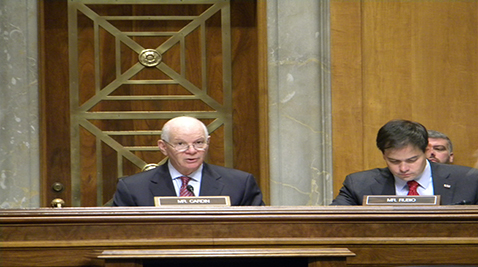WASHINGTON – A high-level State Department official reiterated the Obama administration’s support for the demands of Hong Kong protesters asking for universal suffrage, at a hearing chaired by Maryland Sen. Ben Cardin on Wednesday.
But Daniel Russel, assistant secretary for East Asian and Pacific affairs, said the Chinese government was not breaking the 1997 Basic Law giving Hong Kong greater freedom than the rest of China.
The protests in Hong Kong, known as the Umbrella Movement because of the use of umbrellas by protesters to protect them from tear gas, began in September after Beijing’s announcement that it would limit and screen candidates in Hong Kong’s 2017 elections.
Under the announcement, candidates would need support from at least half of a nominating committee and must “love the country and love Hong Kong,” said Qiao Xiaoyang, chairman of the National People’s Congress Law Committee, last year.
Besides demanding that the restrictions on candidates be rescinded, protesters have also called for the resignation of Hong Kong’s leader, Leung Chun-ying.
“This decision does not necessarily contravene the letter of the Basic Law, but the decision could and should have gone much, much further to allow for a nomination by a broadly representative nominating committee in accordance with democratic procedures,” Russel said.
Hong Kong was brought under Chinese rule in 1997 in a system where the territory would be under a “one country, two systems” policy. The policy was meant to ensure that Hong Kong would be allowed to maintain its capitalist system and relative freedoms.
“We clearly have a very serious issue (with) what’s going on in Hong Kong today,” said Cardin, chairman of the Senate Foreign Relations Committee’s East Asian and Pacific Affairs subcommittee.
Pro-democracy protesters, many of them young university students, took over parts of Hong Kong in September, from major intersections to areas outside government buildings. While police have taken down many of the protest sites, parts of Hong Kong remain occupied by protesters.
The Obama administration’s reaction has been muted.
“These are issues ultimately for the people of Hong Kong and the people of China to decide,” said President Barack Obama, during a trip to Beijing last month.
David Lampton, director of China studies at the Johns Hopkins School of Advanced International Studies, said the response of the Obama administration has been appropriate and responsible.
The protests come at a time of increasing international challenges for the administration, from Syria to Russia, and amid claims by Beijing that Washington is orchestrating the protests.
Questions remain about the effectiveness of the protests.
“Overall, it’s a failure. We could see even though we have occupied some places that it could quickly be cleared by police violently,” said Alex Chow, protest leader and secretary general of the Hong Kong Federation of Students, according to Bloomberg and other news outlets.
One problem associated with the protests has been the lack of any leader or group to speak for everyone, Lampton said.
He said that the demands of the protesters, to rescind the announcement by the Chinese government and the resignation of Hong Kong’s chief executive, were “infeasible goals.”
But the protests have brought global attention to the issue and it is too early to see their impact, Lampton said.
“This senator is going to be watching that (situation in Hong Kong) very closely,” Cardin said.

